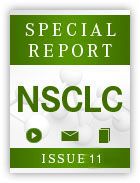Pathological Response Following Neoadjuvant Triplet Associated With Recurrence-Free Survival
The pathological response following pre-operative cisplatin, pemetrexed, and bevacizumab treatment may serve as a surrogate marker for post-surgical recurrence-free survival in patients with non-squamous non–small cell lung cancer.
Pathological response, defined in this study as less than 33% residual primary tumor still viable after neoadjuvant chemotherapy, was found to be significantly associated with RFS and showed a numerical trend with OS. The pathological effect seen from this triplet therapy was moderate (Ef 2) in 3 patients and Ef 3, which designates a pathological complete response (pCR), was noted in another 3 patients. Ef 0, or no pathological response, was reported for 19 patients following neoadjuvant chemotherapy.
The study consisted of 14 male patients and 11 female patients, with a median age of 63 years old (range, 54-71). Three of the patients were clinical stage IIa, 2 patients were stage IIb, and 20 patients were stage IIIa. Seven of the patients had anEGFRmutation, 15 patients had a wild-type mutation, and 3 of the patients’ mutation status was unknown.
A pathological response was seen in 6 patients (24%) who were classified as pathologic responders; of these patients 3 patients (12%) achieved a pCR. No response was seen in 19 patients (76%) who were classified as non-responders.
Pathologic response was significantly associated with RFS at 3 years. One hundred percent of pathological responders achieved 3-year RFS compared with just 15.8% of non-responders achieving 3-year RFS (P= .002).
A similar numerical trend was observed for OS that did not reach statistical significance. Three-year OS was achieved by 100% of pathologic responders compared with 63.2% of non-responders (P= .102).
“Bevacizumab has been demonstrated to improve response and survival rates in patients with advanced nonsmall cell lung cancer. Our previously reported phase II trial assessed the feasibility of the addition of bevacizumab to preoperative chemotherapy in resectable non-squamous NSCLC,” said lead author Yashiro Tsutani, MD, Department of Surgical Oncology, Hiroshima University, Hiroshima, Japan.
Toxicities reported in the study included anemia in 6 patients, pulmonary fistula in 3 patients, supraventricular tachycardia in 3 patients. Pain, fever, pyothorax, pneumothorax, atelectasis, wound infection, pneumonitis, and chlothorax were each reported in 1 patient.
Tsutani discussed a poster outlining the NAVAL study, which evaluated the prognostic role of pathologic response after neoadjuvant chemotherapy with bevacizumab. This phase II feasibility study was conducted by Tsutani and colleagues in 30 patients with resectable clinical stage II/IIIa non-squamous NSCLC prior to surgery, to determine the association between pathologic response and RFS or OS.
All patients received 3 cycles of neoadjuvant cisplatin at 75 mg/m2, pemetrexed at 500 mg/m2plus bevacizumab at 15 mg/kg. Following the neoadjuvant treatment, 25 patients (83%) underwent surgery, 22 patients (88%) had lobectomy, and 3 patients (12%) underwent bilobectomy with systematic lymphadenectomy. No patients received postoperative adjuvant chemotherapy.
The authors of the poster concluded that additional treatment, such as postoperative adjuvant chemotherapy, may be necessary to improve survival in patients with NSCLC that do not show a pathological response following neoadjuvant chemotherapy.
Tsutani Y, Miyata Y, Suzuki K, Takamochi K, Tanaka F, Nakayama H, et al. Pathologic response and survival after cisplatin, pemetrexed, and bevacizumab followed by surgery for clinical stage II/IIIA non-squamous non-small cell lung cancer. Presented at: 2016 ESMO Congress; October 7-11, 2016; Copenhagen, Denmark. Abstract 1197P.

Survivorship Care Promotes Evidence-Based Approaches for Quality of Life and Beyond
March 21st 2025Frank J. Penedo, PhD, explains the challenges of survivorship care for patients with cancer and how he implements programs to support patients’ emotional, physical, and practical needs.
Read More